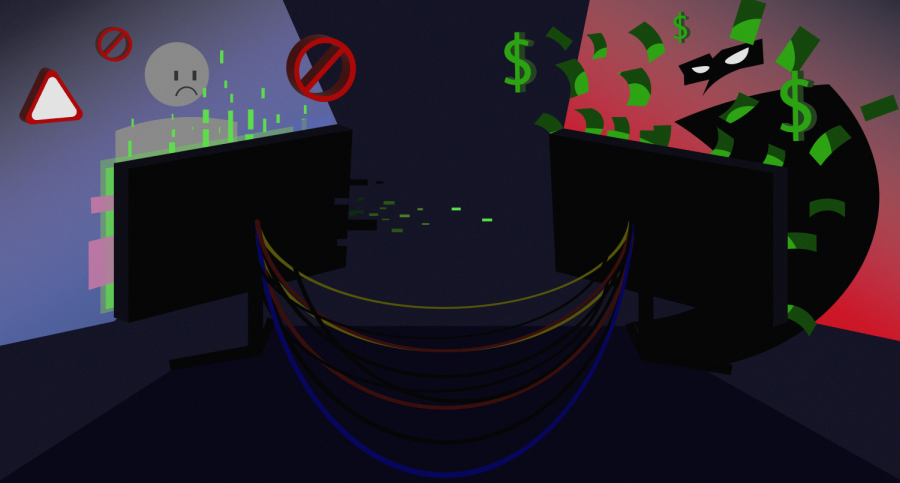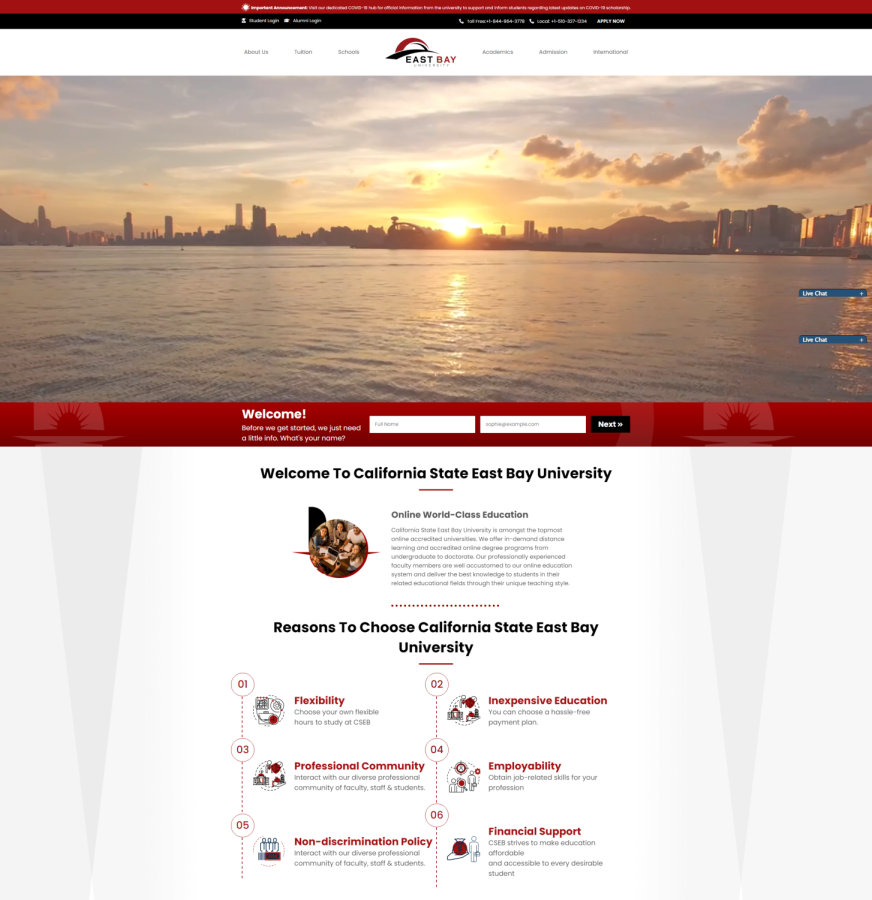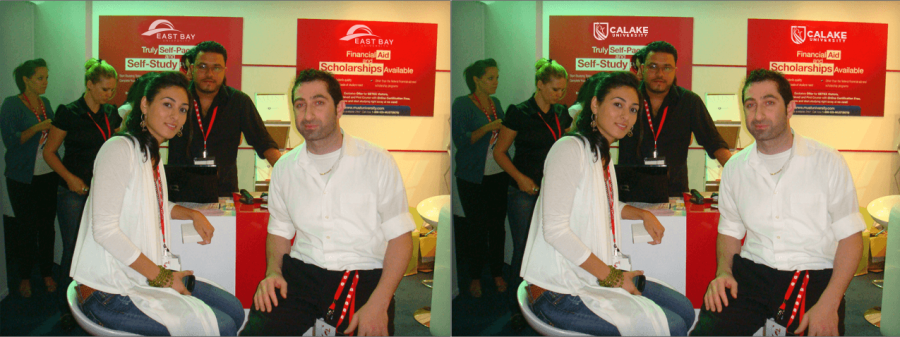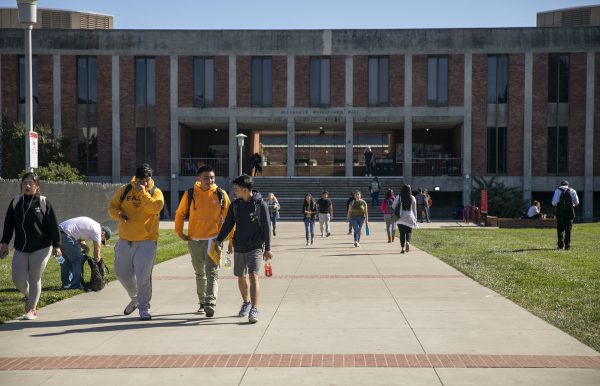East Bay Copycat
July 21, 2022
A website posing as CSUEB opens an international rabbit hole of fraud and mystery.
In recent years, online services have become more common, leading to a rise in internet scams as well. An extension under the university title, “California State East Bay University” was recently brought to the attention of CSUEB administrators. The site, posing as CSUEB, claims to offer online degrees and certifications, in an attempt to take advantage of prospective students.
Recently, university administrators became aware of a “California State East Bay University” —a name, deceptively similar to California State University, East Bay. Mimicking CSUEB branding colors of red, black, and white, the imposter university website is laden with lopsided graphics, awkward vernacular, and sophomoric attempts at web design.
Despite the glaring errors, the fraudulent institution supposedly offers “online world-class education,” proclaiming itself as the 8th “Most Prestigious U.S. University, According To Employers”—surpassing the conventional cachet of the entire University of California System and the Ivy-wreathed Columbia University.
Further investigation of the website casts more suspicion onto the dubious institution. According to the website, the alleged CSEBU is headquartered at Southland Mall, coincidentally—and perhaps, ironically— sharing the address with the Social Security Administration office.
The unaccredited institution was allegedly vetted by the United States Education Commission (USEC) and United States Department of Academic Accreditation (USDAA), neither of which are registered with the national U.S. Department of Education. While the USDAA does not list an address or a P.O. Box, USEC is located at 4310 Goodwin Ave, Kennewick, Wash. 99336. A swift entry of the address into Google Maps yields no matches, casting more doubt on the legitimacy of, not only the University in question but the accreditation network that bolsters it.
Viewing the domain registration for CSEBU on Whois—a web domain search engine and registry—shows the website to be hosted on Ukrainian servers since Jan. 2022, with the business address provided on the database located at a storefront in rural Kyiv. Other identifying information is redacted. In comparison, CSUEB’s website was registered in 2005, along with the registrant address aligning with the official university address.
While the website operates under a Ukrainian host, the institution falls under the jurisdiction of the British Virgin Islands, as outlined in a haphazardly written Terms of Service. Queries on USDAA and USEC follow a similarly seedy pattern, with both websites based in Panama and the Netherlands, registered within the past two years according to the data found on Whois.
To maintain an aura of authenticity, CSEBU claimed to have paneled at GETEX, an education fair in Dubai. In an incredible twist, a reverse image search of the featured photos from the event led to another university website: California Lake University. Closer inspection of the pictures revealed patchy brushwork and crude logo placement at the event booth, heavily implying that the pictures were digitally altered.
Reddit user u/AK_Aries started a Reddit thread on May 9, 2021, at r/Scams, asking fellow users to clarify the validity of ‘California Lake University.’ User u/No-Organization8983 commented, “[California Lake University] toll $2100 without documents then start asking for additional payments for other fake reasons.” The California Lake University website, following a similar pattern to the rest of the websites considered thus far, is based in Panama.
Unfortunately, this is not the first time that someone has attempted to impersonate CSUEB. Lori Bachand, the Associate Vice President for University Communications and Marketing, recalled, “This particular name of [California State East Bay University] is new. There has been another entity that has looked similar and operated in the same premise but named different organizational terms and that has been ongoing. It seems that this resurfaces with different branded names every so often.” According to Bachand, the last instance of imitation was in Dec. 2021, when a similar website appeared under the name of “East Bay University.”
Currently, no formal announcements have been made to the University population. Bachand assured that University Communications and Marketing has shared an internal memo warning of an imposter with partners and departments that may receive relevant inquiries, such as Student Affairs and University Extension. CSUEB’s legal counsel has “forwarded [the complaint] to the [state] Attorney General and federal agents,” Bachand said. The former entity known as “East Bay University” was successfully taken down last fall following a similar protocol.
The motivation for impersonating CSUEB may be attributed to luring prospective international students, primarily from the Middle East and Southeast Asia. Bachand noted that there was little concern for possible confusion among the domestic applicant pool, as “most of our students come from the region or state, so [local] students that know us.”
International students, however, may be more vulnerable to these scams. In Fall 2020, international students made up 4.9% of the undergraduate student population and 20.3% of the graduate student population. With restrictions on international travel and in-person education fairs being moved online, the only way international students can learn more about CSUEB is via the internet, where such attempts at impersonation have higher outreach.
To avoid falling victim to attempts at fraud, University Communications and Marketing advises exercising awareness in cyberspace. “Look for some of those key indicators: a secured website (https), and making sure things are spelled correctly and in common use,” explained Bachand, elaborating that a website using the British English spelling in the U.S. warrants caution in case of uncertainty regarding website validity.
Bachand reiterated common safety tips, advising individuals to “never give out personal identifying information to an organization that you don’t know and never give money to an entity online, unless you know and have a relationship with that particular vendor.”
As future guidance, University Communications and Marketing encourages students to report abnormal instances such as this. “If one of our East Bay community members says [something], then that allows us to make sure that we’re not putting any of our students or faculty or staff in a position where they may be harmed in any way,” said Kimberly Hawkins, News and Media Manager.




















